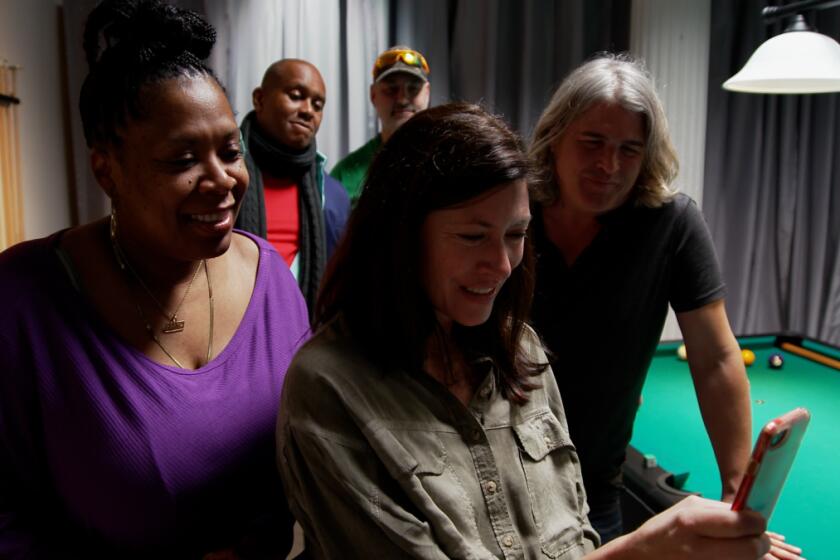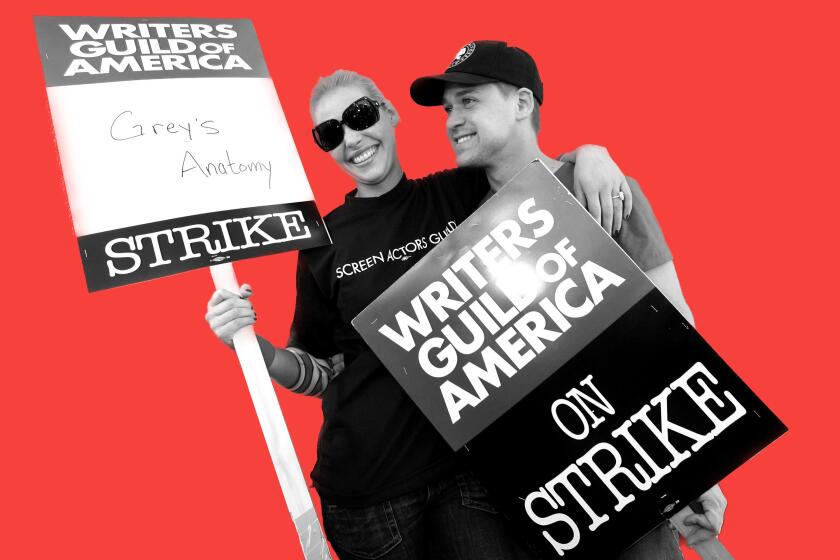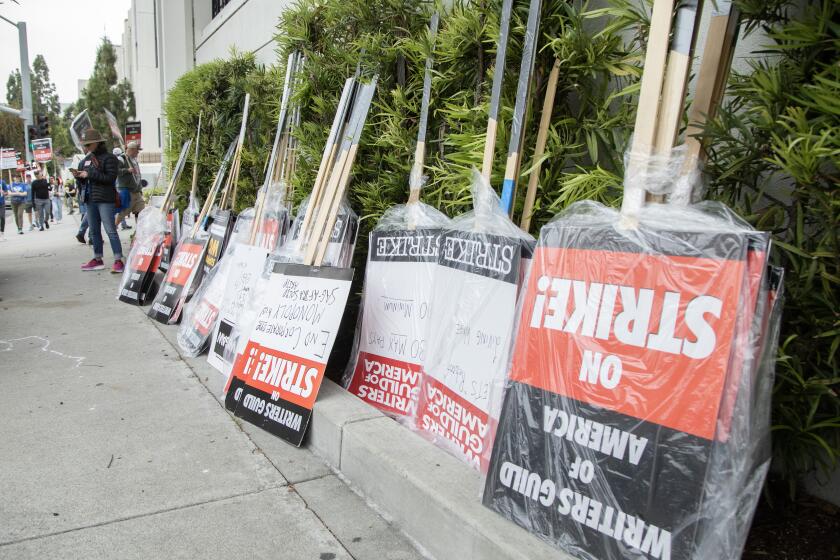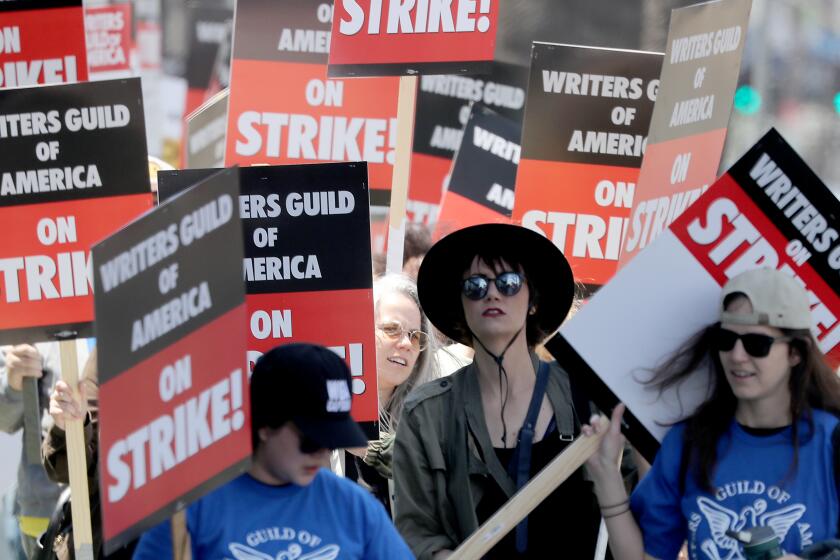
What will we watch if a Hollywood writers’ strike once again rattles the television universe?
If history is any indication, there’s at least one answer: reality TV. And plenty of it.
Most of the producers who craft reality TV story lines are not affiliated with a union and will not be affected by a strike. The genre also tends to be cheaper and less time-consuming to produce than scripted TV, making it an ideal alternative during past work stoppages.
Streaming has transformed television and led to a surge in content, but it also has squeezed Hollywood writers. Five Writers Guild of America members share their stories.
The 1988 Writers Guild of America strike, which lasted 153 days, helped popularize shows like “Cops” and “America’s Most Wanted” for Fox, then an upstart network. And the last writers’ strike, which spanned November 2007 to February 2008, prompted networks and studios to order new unscripted programming and accelerate the return of others, including “Paradise Hotel,” “Big Brother,” and “Celebrity Apprentice,” to plug programming holes during prime time.
Now, as the WGA continues tense negotiations with studios on a new master TV and film contract, the possibility of another strike is on the horizon. Unscripted programming is once again poised to serve as a stopgap for networks and streaming services in the event of a prolonged halt in scripted production. However, this time it’s more complicated.
The TV landscape has undergone dramatic changes over the last decade and a half as traditional broadcast networks competed with cable outlets and streaming services for audiences, meaning there is already a glut of content — unscripted and otherwise — for viewers to watch. Therefore, the need to summon more shows may be less urgent. Viewers may even breathe a sigh of relief if they finally have time to catch up on “The Wire” — or “The Great British Baking Show.”
As Mike Fleiss departs and the show’s own Black stars publicly demand ‘accountability,’ behind-the-scenes changes point to a franchise at the crossroads.
And while reality TV has proved to be the industry’s inexpensive pinch-hitter, it has matured into a formidable genre, and in the entertainment industry’s union ecosystem, it has a complex history. This time around, it is likely to draw more attention to ongoing labor issues.
Compared with scripted television, wages for unscripted series are lower, hours are longer and efforts to unionize have been met with fierce resistance. Workers at a handful of production companies, including Alex Gibney’s Jigsaw Productions and Sharp Entertainment, maker of the hugely popular “90 Day Fiancé” and its various spinoffs, have successfully organized with the Writers Guild of America, East. In March, writer-producers at BSTV, a nonfiction production company specializing in cooking shows, joined them.
“We’re all impatient to get as much done as possible, because it’s still a pretty hard place to make a living,” said Lowell Peterson, executive director of the Writers Guild of America, East, citing the long hours, difficulty of obtaining health insurance, and lagging diversity in reality TV.
As it came to prominence in the late ‘90s and early 2000s, reality TV was often dismissed and ridiculed as a mindless and meaningless fad. Since then, it has matured into an entertainment-industry titan and pop culture touchstone that attracts loyal and passionate audiences even as its novelty has eroded.
A new season of Netflix’s “Love Is Blind” can command as much social chatter as new episodes of “Succession,” and in what seems a weekly occurrence, a must-watch docuseries about serial killers, scammers or cult leaders is released.
Although Netflix and other streaming services are guarded about viewing figures, it’s clear that many of these shows are hits, scoring quick renewals and inspiring various spinoffs and crossover shows. Once relegated to the slow summer or winter months, unscripted programming now takes up more space year-round alongside its scripted counterparts on prime-time network schedules and on streaming services.

Today, reality TV encompasses three nontechnical Emmy categories and blurs the lines with the documentary genre (which has its own Emmy categories).
“Even though it may be a bit more disposable — you snack on it, and then you kind of move on — it is still the best game in town for most of the programmers,” said one reality TV producer who requested anonymity and did not comment directly on the strike. “It’s still the most viable type of content” when compared with the cost and risk associated with scripted programming.
With the media industry in the middle of a transformative shift, fueled by consolidation and downward pressure on budgets, unscripted television remains an attractive lower-risk endeavor for programmers. Depending on the network and type of show, budgets for reality shows can range from $100,000 to more than $3 million per episode. It’s also a nimble format — filming can start and end quickly, and it can produce a high volume of content in a short window, which can be useful if networks and studios start to sense a gap in programming.
So far, there hasn’t been a noticeable scramble in the marketplace to bank new content to offset any lengthy labor action, according to some reality TV producers.
Layoffs, hints of a recession and an uncertain future for streaming add up to contentious negotiations as the WGA looks for a new deal with Hollywood studios.
“The market and the buyers have changed so much in the last 15 years. There was such a boom in the last year of programming that we have multiple shows that haven’t aired yet. There hasn’t been that sort of panic that I think we all kind of felt more in 2008,” said another reality TV producer, who also requested anonymity.
The dynamic between reality TV and the WGA has a complicated history — the format has been viewed by WGA members as both a threat to scripted TV’s grip on prime-time schedules but also a worthy ally to prevent networks and studios from using it as programming leverage during a work stoppage. The WGA sought to add animation and reality TV writers under the contract it was negotiating in 2007, but the demand eventually became one of its concessions.
The 2007-08 writers’ strike, and lingering mistrust between big media companies and their Hollywood workers, has cast a long shadow over current WGA contract talks.
However, over the last decade, workers in reality TV have grown increasingly vocal about the grueling hours, low pay and poor benefits they face in what has been likened to an industry sweatshop. Although they don’t necessarily write dialogue, they must create compelling character arcs and gripping story lines — work that requires skill and should be recognized with adequate compensation, they argue.
Toni-Ann Lagana, a reality producer who has spent more than a decade in the business on shows including “American Idol” and “Dancing With the Stars,” hit a breaking point two years ago after regularly working 18-hour days for months during the thick of the pandemic. Now a supervising producer on Fox’s “The Masked Singer,” Lagana believes that she and others are skilled storytellers who deserve more respect and improved working conditions. “We are crafting the entire story line before it gets to the editor. We are writing, whether it’s on an Avid or paper.”
She is hopeful about the prospect of a union for unscripted producers, who often struggle to qualify for employer-backed healthcare because they go from one freelance gig to the next, and believes it is essential for the long-term well-being of the business, which is losing talented producers to burnout. “I have seen so many people leaving California and the industry. Everyone has their limit,” she said. “All of them loved what they did, but they had to change their lifestyle. I believe we can do the same amount of work but in a more humane way. We don’t need to keep stretching that rubber band to see how far it will go.”
But progress has been halting, and unscripted workers who have attempted to organize often face intense resistance from the production companies that usually make shows for major networks and streaming services. In 2015, the owners of Jane Street, a New York production company, sent an email urging their writer-producers not to vote for the union. The letter was widely circulated in the industry and even published by Deadline. A 2017 walkout by hundreds of reality writers in New York was dismissed by Leftfield Pictures, a prolific producer of unscripted content, as “a feeble attempt to leverage publicity.”
“Companies have been particularly oppositional,” said the Writers Guild’s Peterson. “This subsector of the entertainment industry was set up [to be] intentionally nonunion. Not just writers, but they didn’t want to deal with IATSE or anybody. They thought they could produce this content much more cheaply. And if they have to start paying people their real value, it’s more expensive. It’s our job to make sure the value is recognized.”
More to Read
Inside the business of entertainment
The Wide Shot brings you news, analysis and insights on everything from streaming wars to production — and what it all means for the future.
You may occasionally receive promotional content from the Los Angeles Times.





















